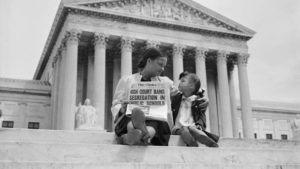
May 16: Brown v. Board
 In 1954, the Supreme Court ruled in Brown v. Board of Education of Topeka that keeping children in “separate but equal” public schools was a violation of the Constitution. Nearly 70 years prior, in Plessy v. Ferguson, the Court had allowed for segregation in public facilities, including train cars. In that case, Justice John Marshall Harlan had disagreed with the case’s outcome, writing, “Our Constitution is color-blind and neither knows nor tolerates classes among citizens. In respect of civil rights, all citizens are equal before the law.” In Brown v. Board, Harlan’s view of the Constitution was adopted. Though many Americans resisted integration of schools, the decision in Brown marked a huge victory for proponents of civil rights and helped redefine equality in the nation.
In 1954, the Supreme Court ruled in Brown v. Board of Education of Topeka that keeping children in “separate but equal” public schools was a violation of the Constitution. Nearly 70 years prior, in Plessy v. Ferguson, the Court had allowed for segregation in public facilities, including train cars. In that case, Justice John Marshall Harlan had disagreed with the case’s outcome, writing, “Our Constitution is color-blind and neither knows nor tolerates classes among citizens. In respect of civil rights, all citizens are equal before the law.” In Brown v. Board, Harlan’s view of the Constitution was adopted. Though many Americans resisted integration of schools, the decision in Brown marked a huge victory for proponents of civil rights and helped redefine equality in the nation.




